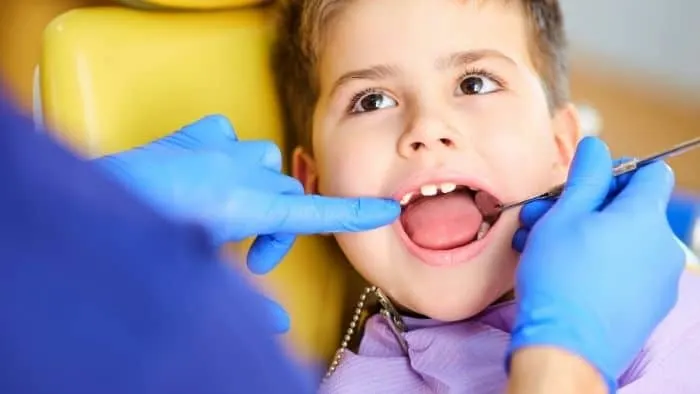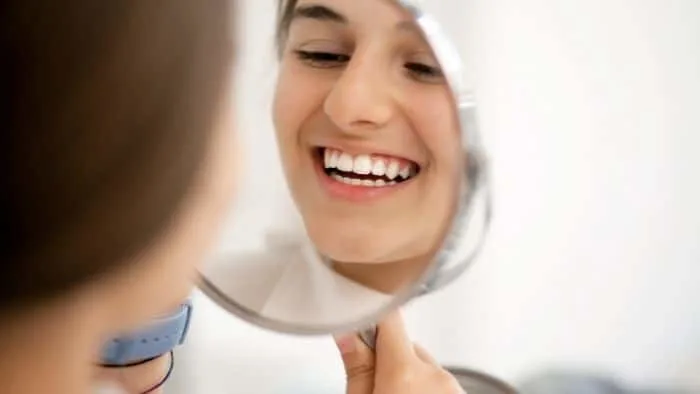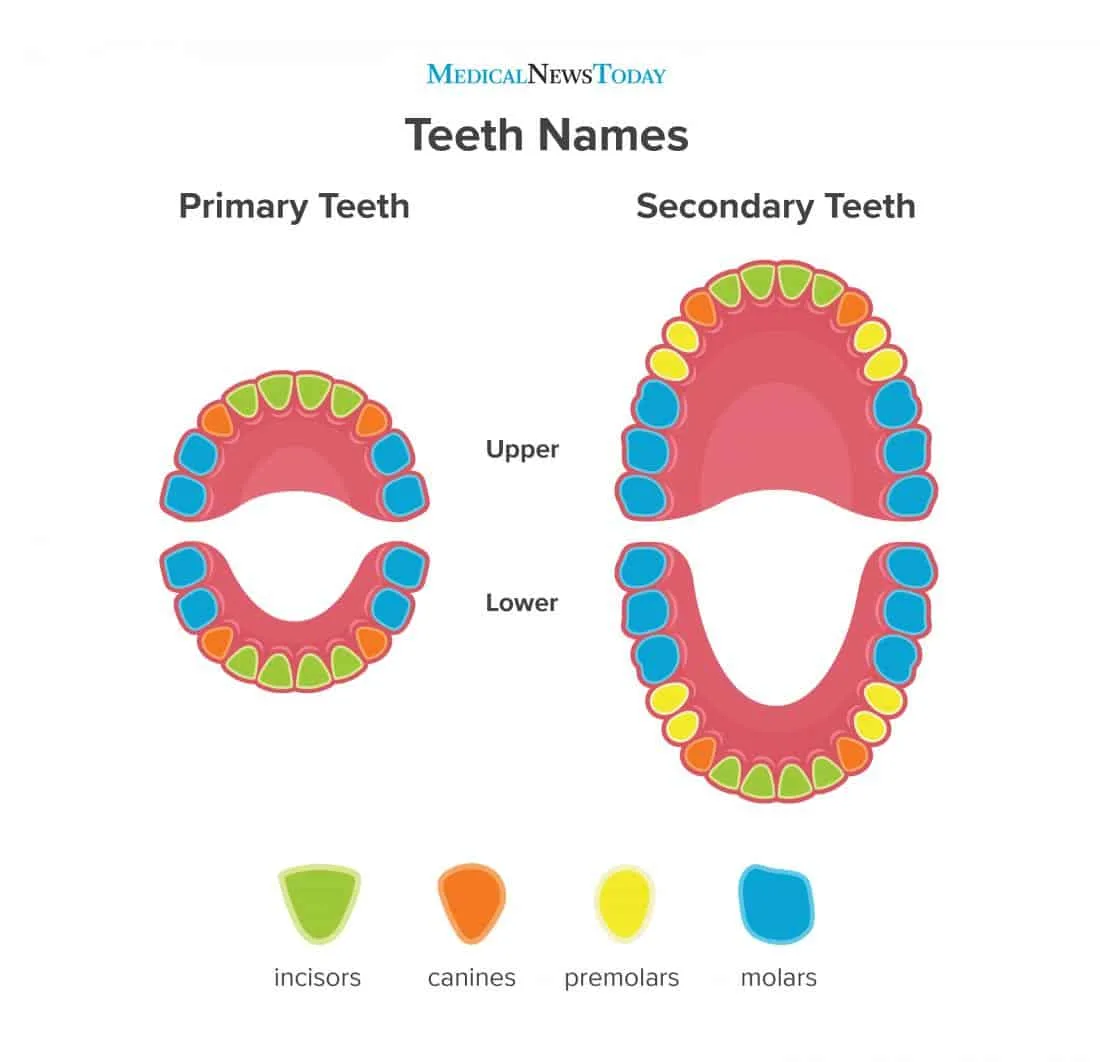Children should have 20 baby teeth by the time they’re three years old. These are eventually replaced by 28 permanent adult teeth by the time they are 13 years old. Teens may also get up to four more teeth called wisdom teeth, or third molars, between the ages of 17 and 21.
How Many Teeth Do Teenagers Have?

Most parents will probably know that we all have two sets of teeth. We start with 20 baby teeth, which are eventually replaced by 28 adult teeth.
Babies start getting their first set of teeth around six months of age. These baby teeth are also known as primary teeth or technically deciduous teeth.
From about six years of age, these primary teeth will start falling out, to eventually be replaced by adult teeth.
This is a slow process where they lose a few baby teeth every year. By the time your child is 13 years old, all their baby teeth should have been replaced by 28 adult teeth.
Between the ages of 17 and 21 years, teens can get up to four more teeth called wisdom teeth. We’ll discuss wisdom teeth a bit more later on.
So a teen can have a total of 32 teeth, including 8 incisors, 4 canines, 8 premolars, 12 molars, and up to 4 wisdom teeth.
How Many Baby Teeth Do Children Have?

Children will get a total of 20 baby teeth – 10 teeth on top and 10 teeth on the bottom.
These 20 teeth usually start appearing from six months of age and should all come in by the time your child is three years old. These baby teeth serve as placeholders for the adult teeth that grow in after the baby teeth fall out.
Most children begin to lose their baby teeth around the age of six, which are replaced by adult teeth by the time they’re 13 years old.
At What Age Do Children Start Getting Permanent Teeth?
Primary teeth fall out when the permanent tooth behind them pushes it out of the way.
Children will usually start swapping their baby teeth for adult teeth, one by one, from six years old.
As the permanent teeth grow in, they gradually replace the primary teeth. By the age of 12 or 13, most kids have lost all their baby teeth and have a complete set of 28 permanent adult teeth.
You can see the order in which permanent teeth start appearing in the table below:
| Type of teeth | Number of teeth | Age baby teeth are lost | Age adult teeth erupt |
|---|---|---|---|
| Upper jaw | |||
| Central incisor | 2 | 6– 7 years | 7–8 years |
| Lateral incisor | 2 | 7–8 years | 8–9 years |
| Canine | 2 | 10–12 years | 11–12 years |
| First premolar | 2 | 9–11 years | 10–11 years |
| Second premolar | 2 | 10–12 years | 10–12 years |
| First molar | 2 | - | 6–7 years |
| Second molar | 2 | - | 12–13 years |
| Third molar or wisdom teeth | 2 | 17–21 years | |
| Lower jaw | |||
| Central incisor | 2 | 6–7 years | 6–7 years |
| Lateral incisor | 2 | 7–8 years | 7–8 years |
| Canine | 2 | 9-12 years | 9–10 years |
| First premolar | 2 | 9-11 years | 10–12 years |
| Second premolar | 2 | 10-12 years | 11–12 years |
| First molar | 2 | - | 6–7 years |
| Second molar | 2 | - | 11–13 years |
| Third molar or wisdom teeth | 2 | - | 17–21 years |
| Total teeth | 32 |
How Many Teeth Do Adults Have?
Adults have 28 teeth, plus up to four additional wisdom teeth, bringing the total to 32 teeth. Adult teeth include 8 incisors, 4 canines, 8 premolars, 12 molars, and up to 4 wisdom teeth.
- 8 incisors – these are the four front teeth on the top and bottom of your mouth, used for holding and cutting food.
- 4 canines – these are the pointed teeth right next to your incisors. These have cusps that help you tear food apart.
- 8 premolars – these teeth are between the canines and molars. Premolars are used to cut and tear food.
- 8 molars – adults have eight molars on top and bottom. These teeth grind down food before it is swallowed.
- 4 molars (wisdom teeth) – in addition, adults can get a third set of molars (four teeth) called wisdom teeth, right at the back of their mouths. Wisdom teeth can erupt as late as the early 20s and are often removed if necessary.
Watch this video that clearly shows the process of changing from baby teeth to adult teeth:
Wisdom Teeth In Teenagers
At What Age Do Teenagers Get Wisdom Teeth?
A teen may also grow up to four more teeth called the third molars or wisdom teeth.
Wisdom teeth usually appear between the ages of 17 and 21 for most children and young adults.
Can I Keep My Wisdom Teeth?
Some people may need to have their wisdom teeth removed. However, this is only necessary if your wisdom teeth cause overcrowding or if they become infected.
Having too many teeth or overcrowding can cause:
- Misaligned teeth
- An increase in decay
- Wisdom teeth that are impacted
- The risk of periodontal disease
If a teen experiences any of the following symptoms, a dentist or oral surgeon may recommend wisdom tooth removal:
- The tooth causes a great deal of pain.
- The tooth is impacted or infected.
- The tooth crowds the surrounding teeth.
- The tooth makes it difficult to keep the other teeth clean.
If necessary, it is recommended to remove the wisdom teeth while you’re in your early 20’s as the roosts and bone of the teeth are softer, making them easier to remove.
However, if your wisdom teeth don’t cause any problem, then your dentist will most likely decide to leave them alone.
Is It Rare To Have All 4 Wisdom Teeth?
Most people expect their wisdom teeth to emerge in their late teens or early twenties. Although most people have one to four wisdom teeth, some don’t have any at all.
Not everyone gets their wisdom teeth taken out. In fact, in many people, their wisdom teeth remain buried, or only 1 or 2 will erupt. If they stay buried with no problems, you can leave them in.
There is a small percentage of lucky people who are born with at least one wisdom tooth missing. Some people don’t have any at all!” – cda.org
As humans evolve and don’t need as strong jaws and as many teeth, more people are born without any wisdom teeth at all.
About 20-25% of the human population is born with 1 to 3 wisdom teeth, and 35% is born without any wisdom teeth at all.”- weatonoralsurgery.com
How Many Teeth Do You Really Need?

Adults can have 32 permanent teeth. Most Americans, however, have their wisdom teeth (or 3rd molars) extracted as teenagers, leaving them with 28 teeth on average.
Excluding the wisdom teeth, each person has 14 teeth in their upper jaw and 14 in their lower jaw. There are four incisors, two canines, four premolars, and four molars in each jaw.
Many patients will not be happy if they lose a front tooth, but many people may not care as much about a missing back tooth.
Many people only have 26 teeth in their mouth because they lost some of them due to cavities or other factors contributing to the loss of teeth, such as injury.
Replacing a lost tooth will depend on where the missing tooth is located in the mouth and whether it affects your ability to chew food.
Dental health care is expensive, so it’s best to take good care of your teeth to avoid future dental concerns.
Conditions That Affect The Number of Teeth

The following are some conditions that affect the number of teeth an adult might have:
Brushing (at least) twice a day and flossing daily
People who do not take their dental care seriously and brush twice a day can lose their pearly whites. This is because it is very easy to get cavities as one ages. This can also be due to genetics, but sometimes people neglect to brush after every meal and only clean the outside of their teeth only.
Flossing daily also helps keep your teeth as healthy as possible. This is because it cleans the spot between each tooth where food particles tend to hide, leading to cavities.
Flossing also helps prevent gum disease, which many adults have. When gums start receding, they can expose more of their teeth and make them more sensitive to hot and cold.
Tooth decay
Another condition affecting the number of teeth you have is tooth decay. This occurs when food particles get stuck in between the gaps in your teeth, and bacteria eat away at your enamel.
Enamel is usually a protective layer, but when large amounts of food are trapped in it, there is insufficient saliva to neutralize the acid.
When this happens too often, tooth decay can develop. This occurs when the teeth are weakened, and bits of enamel start going missing. Since there is not much protection left in the teeth, it becomes easy for bacteria to eat away at them.
You might also like to read: Can Dentists Tell If You Vape & Will They Tell Your Parents?
Ectodermal dysplasia (a genetic disorder that can affect teeth)
People with ectodermal dysplasia have a disorder that affects their teeth and hair.
Ectodermal dysplasia comes from a mutation in one gene that controls how skin, nerve cells, and many other things form during pregnancy.
Gastrointestinal reflux
Gastrointestinal reflux is the process in which gastric acid comes back up into the mouth.
This can make teeth corrode because it causes enamel to break down.
Gastrointestinal reflux usually occurs because of a hiatal hernia or other conditions that make pressure rise in the stomach.
FAQ
How Many Teeth Does A 15-Year-Old Have?
At the age of 15, an average teenager has 28 permanent adult teeth. The four additional wisdom teeth may only start emerging between 17-21 years of age.
Why Do Some Teenagers Still Have Baby Teeth?
It is unclear why some people retain their baby teeth at older ages. The cause could be genetic, environmental, or endocrine-related. It is possible for a teenager to have dental ankylosis, which prevents baby teeth from falling out because they fuse to the jaw bone.
If your baby teeth are still in place by the time you reach your early 20s, then you should make an appointment with your dentist to either get them removed or discuss the best plan of action.
Summary Teen Teeth
Teeth in humans include incisors, canines, premolars, and molars. At about age 3, children usually have all of their 20 primary teeth. Most teens will have their adult teeth by 13. Most people will get their wisdom teeth by the age of 21 and have all their 32 permanent teeth.
Several conditions can affect the number of teeth you have, but unless something external is happening, cleaning and flossing every day will help you ensure you have healthy teeth and avoid oral health issues.

